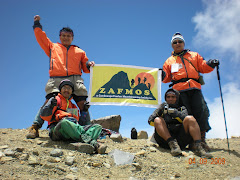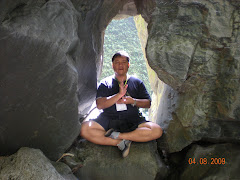Thursday, October 29, 2009
Wednesday, October 7, 2009
This is an Article on our Global Concern on Environmental Destruction
What is Happening to our Planet?
(A Call for Continuing Dialogue with Creation)
The recent sufferings in loss of lives and damage to properties brought about by two typhoons (international names Ketsana and Parma, locally Ondoy and Pepeng respectively) in September have shaken many people. Those most affected were residents of the National Capital Region (Metro Manila and environs) and several provinces of Luzon.
Within the same fortnight there was the earlier epic dust storm in Australia, the worst that country has seen in many decades. Typhoon Ondoy’s impact on Metro Manila was something that had not been experienced in 30 years. The damage came not from strong winds but from the flood that inundated many areas in Metro Manila. In some places the water went up to the rooftops. Some few days later an earthquake struck Sumatra in Indonesia, killing some 1000 people. Spawned by the earthquake, a tsunami hit Samoa, American Samoa and Tonga in the South Pacific, leveling buildings and killing about a hundred people. When the people affected by Ondoy were still in evacuation centers in Metro Manila another typhoon, Pepeng, entered the Philippines.
What is happening to our planet?
While anticipating Pepeng, which was forecast as a super typhoon with winds in the vicinity of 200 km/hour, in addition to the usual advice on how to safely prepare for the typhoon, a prayer made the rounds in the Philippines.
We quote from the prayer:
“We have not been good stewards of creation. We have confused your command to subdue the Earth. The environment is made to suffer our wrongdoing, and now we reap the harvest of our abuse and indifference“
Scientists have reported that because of global warming and the climate change that it leads to, natural phenomena like typhoons now occur more often and with greater intensity. And consequently, more harm to man. Weather disturbances are still part of nature, but their frequency and intensity are the results of man’s actions.
The earth has been given by God and it is for all of us who inhabit it – mankind, animals on land, fish in the water, birds in the air and all the plants in the lithosphere and the hydrosphere. In Genesis God gives man stewardship over creation; all that is on earth man can use for his good. The prayer reminds us that we have not been responsible in our exercise of stewardship. In many instances, the wealth of the earth has not been used for man’s good but rather abused for man’s greed.
The vision of Silsilah, which has at its core the four pillars of dialogue - dialogue with God, with the self, with others and with creation - recognizes that we must understand and respect the dynamics of relationship between man and creation if we are to arrive at peace in our world. Destruction caused by natural phenomena does not generate a peaceful atmosphere among men. Abuse of natural resources does not general peace. If man must live in peace among themselves, they must learn to live in peace with creation.
Let us now say what we must:
“We turn to You, our loving God, and beg forgiveness for our sins.”
(A Call for Continuing Dialogue with Creation)
The recent sufferings in loss of lives and damage to properties brought about by two typhoons (international names Ketsana and Parma, locally Ondoy and Pepeng respectively) in September have shaken many people. Those most affected were residents of the National Capital Region (Metro Manila and environs) and several provinces of Luzon.
Within the same fortnight there was the earlier epic dust storm in Australia, the worst that country has seen in many decades. Typhoon Ondoy’s impact on Metro Manila was something that had not been experienced in 30 years. The damage came not from strong winds but from the flood that inundated many areas in Metro Manila. In some places the water went up to the rooftops. Some few days later an earthquake struck Sumatra in Indonesia, killing some 1000 people. Spawned by the earthquake, a tsunami hit Samoa, American Samoa and Tonga in the South Pacific, leveling buildings and killing about a hundred people. When the people affected by Ondoy were still in evacuation centers in Metro Manila another typhoon, Pepeng, entered the Philippines.
What is happening to our planet?
While anticipating Pepeng, which was forecast as a super typhoon with winds in the vicinity of 200 km/hour, in addition to the usual advice on how to safely prepare for the typhoon, a prayer made the rounds in the Philippines.
We quote from the prayer:
“We have not been good stewards of creation. We have confused your command to subdue the Earth. The environment is made to suffer our wrongdoing, and now we reap the harvest of our abuse and indifference“
Scientists have reported that because of global warming and the climate change that it leads to, natural phenomena like typhoons now occur more often and with greater intensity. And consequently, more harm to man. Weather disturbances are still part of nature, but their frequency and intensity are the results of man’s actions.
The earth has been given by God and it is for all of us who inhabit it – mankind, animals on land, fish in the water, birds in the air and all the plants in the lithosphere and the hydrosphere. In Genesis God gives man stewardship over creation; all that is on earth man can use for his good. The prayer reminds us that we have not been responsible in our exercise of stewardship. In many instances, the wealth of the earth has not been used for man’s good but rather abused for man’s greed.
The vision of Silsilah, which has at its core the four pillars of dialogue - dialogue with God, with the self, with others and with creation - recognizes that we must understand and respect the dynamics of relationship between man and creation if we are to arrive at peace in our world. Destruction caused by natural phenomena does not generate a peaceful atmosphere among men. Abuse of natural resources does not general peace. If man must live in peace among themselves, they must learn to live in peace with creation.
Let us now say what we must:
“We turn to You, our loving God, and beg forgiveness for our sins.”
Subscribe to:
Comments (Atom)



